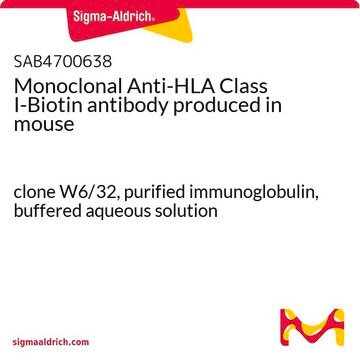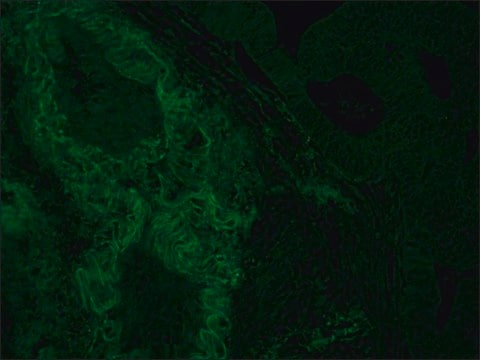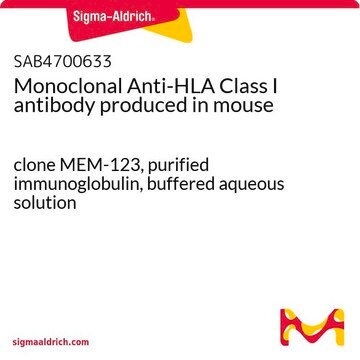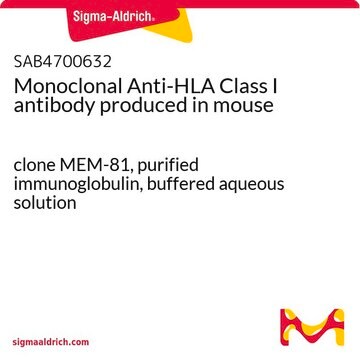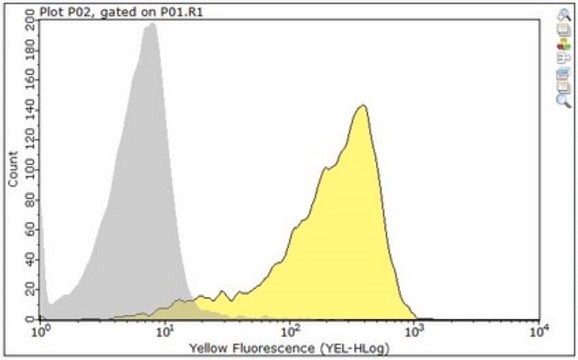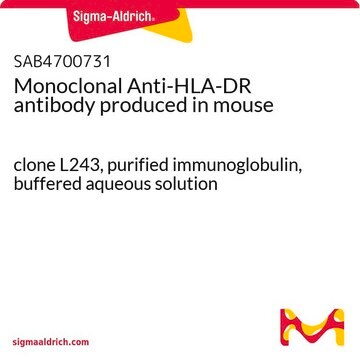H1650
Monoclonal Anti-HLA Class I Antigen antibody produced in mouse
clone W6/32, purified immunoglobulin, buffered aqueous solution
Synonym(e):
Monoclonal Anti-HLA Class I Antigen
About This Item
Empfohlene Produkte
Biologische Quelle
mouse
Qualitätsniveau
Konjugat
unconjugated
Antikörperform
purified immunoglobulin
Antikörper-Produkttyp
primary antibodies
Klon
W6/32, monoclonal
Form
buffered aqueous solution
Speziesreaktivität
monkey, human
Methode(n)
flow cytometry: 5 μL using 1 × 106 cells
immunoprecipitation (IP): suitable
indirect immunofluorescence: 1:10 using acetone-fixed human tonsil frozen sections.
Isotyp
IgG2a
UniProt-Hinterlegungsnummer
Versandbedingung
wet ice
Lagertemp.
2-8°C
Posttranslationale Modifikation Target
unmodified
Angaben zum Gen
human ... HLA-A(3105) , HLA-B(3106) , HLA-C(3107)
Suchen Sie nach ähnlichen Produkten? Aufrufen Leitfaden zum Produktvergleich
Allgemeine Beschreibung
The previously assigned protein identifier P01891 has been merged into P04439. Full details can be found on the UniProt database.
Spezifität
4th Workshop: code no. P1
5th Workshop: code nos. BP166, BP288, BP407, B 005
Immunogen
Anwendung
Immunofluorescence (1 paper)
Biochem./physiol. Wirkung
Physikalische Form
Haftungsausschluss
Sie haben nicht das passende Produkt gefunden?
Probieren Sie unser Produkt-Auswahlhilfe. aus.
Lagerklassenschlüssel
12 - Non Combustible Liquids
WGK
WGK 1
Flammpunkt (°F)
Not applicable
Flammpunkt (°C)
Not applicable
Analysenzertifikate (COA)
Suchen Sie nach Analysenzertifikate (COA), indem Sie die Lot-/Chargennummer des Produkts eingeben. Lot- und Chargennummern sind auf dem Produktetikett hinter den Wörtern ‘Lot’ oder ‘Batch’ (Lot oder Charge) zu finden.
Besitzen Sie dieses Produkt bereits?
In der Dokumentenbibliothek finden Sie die Dokumentation zu den Produkten, die Sie kürzlich erworben haben.
Kunden haben sich ebenfalls angesehen
Unser Team von Wissenschaftlern verfügt über Erfahrung in allen Forschungsbereichen einschließlich Life Science, Materialwissenschaften, chemischer Synthese, Chromatographie, Analytik und vielen mehr..
Setzen Sie sich mit dem technischen Dienst in Verbindung.